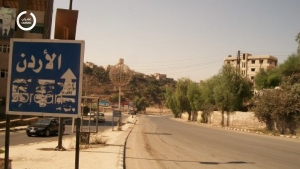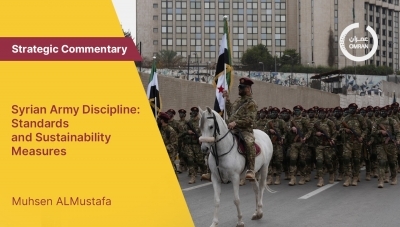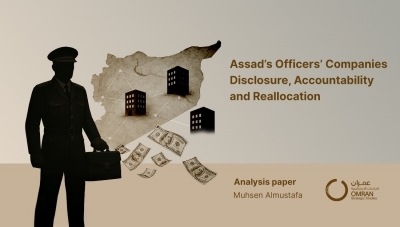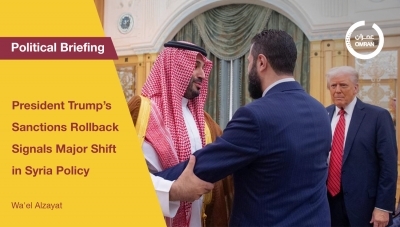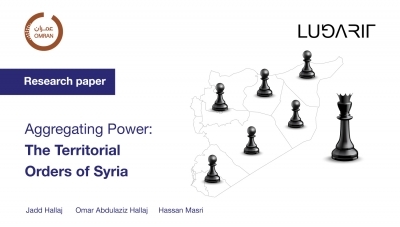Events
From Settlement to Captagon: The Security Dynamics in Syria’s Daraa
The Captagon problem has been one of the most critical security dilemmas for Jordan, due to the increasing attempts of drug and weapon trafficking into its borders that became a threat to Jordan’s national security according to a formal assessment paper, along with the ineffectiveness of the current mechanisms to deter the actors involved in Captagon, particularly Iran-backed militias and the Syrian regime. Although the 2017 de-escalation agreement is supposed to grant Iran-backed militias being pushed back 40 km from the Jordanian border, Russia has not completely fulfilled its pledges. The Russian-sponsored settlements of 2018 and 2021 have failed to introduce a security-providing environment through the DDR process of opposition armed groups in Syria’s Daraa.
The security dynamics of the settlements have played a crucial role in creating a Captagon-friendly environment i.e. the absence of a hegemon actor with the involvement of Russia, Iran, and the regime, in addition to former opposition groups which underwent a transformation process in terms of their motivations (political or economic) and objectives of the use of force (zero-sum or variable-sum). Many of the armed groups that had fought fiercely against the Syrian regime gave up on their political aspiration and became involved in Captagon trafficking. This article provides insight into the security landscape, particularly the interconnection between security and Captagon, as a war economy dynamic, in Syria’s Daraa, and ultimately proposes alternative policy scenarios.
The Status Quo of the Settlements
The settlements of 2018 and 2021 between the Syrian regime and opposition factions under Russian auspices resulted, mainly, in the piecemeal return of the regime’s security apparatuses to the governorate, and the integration of many opposition fighters into these apparatuses, without achieving concrete progress vis-a-vis the detainees or forcibly-disappeared persons in regime’s prisons. Since the first settlement, Daraa has been characterized by a fragile security with the prevailing wide scale, politically motivated to a large extent, violence against various civil and armed individuals, let them be affiliated with the opposition or the regime.
Assassinations and detentions, at which dozens of individuals are targeted monthly, have been the regime’s tools to eliminate his opponents relying, for the most part, on the Military Intelligence Branch of Daraa/Swayda, led by “Loay al-Ali”– an EU, UK, and Canada sanctioned Brigadier-General who was promoted to his current position before the 2018 settlement after he served head of the military intelligence/Daraa section between 2011 and 2018.
Thus, the regime rested on a variable-sum use of force to strengthen its territorial control, eliminate opponents, benefit economically from Captagon trafficking, and underpin its central role in the settlement status quo. Yet, even the transformation of regime behavior from zero-sum to variable-sum is mainly a result of Russian diplomatic coercion and the externally imposed status quo in Syria i.e. the relatively frozen conflict that started to arise in 2018.
The Transformation of the Opposition Armed Groups
Former opposition armed groups in Daraa have pursued different survival strategies to cope with or counter-balance the increasing security leverage of the regime in the governorate. Their transformations have generated different types of armed groups with varying motivations and objectives. While the 8th brigade became mainly motivated by preserving the settlement’s status quo that granted the brigade territorial control over some localities and a maneuvering ability to expand influence; other groups, many of which became associated with the regime, have relinquished their political motivations for economic ones through getting involved in Captagon trafficking and/or thuggery activities.
The 8th brigade led by the former opposition commander, Ahmed al-Oda, and composed mainly of former opposition fighters of “Sunna Youth Forces,” has maintained its territorial control in Eastern Daraa’s Busra al-Sham since its establishment under Russian auspices in the aftermath of the first settlement in 2018. Given the relatively secure environment with the lowest assassination rate and the better governance services in areas under its control in comparison with other areas in Daraa, the brigade has managed to preserve social support and counterbalance the regime’s influence seeking to preserve the settlement status quo. Yet, the brigade increased its leverage through variable-sum use of force.
The 8th brigade conducted multiple security operations against ISIS or groups accused of ISIS affiliation in different parts of Daraa such as Jasim in Western Daraa in August 2022 and Daraa al-Balad neighborhood where the operation eliminated the Hafo-Harfoush militia in December 2022. These operations were conducted after the regime’s escalation and threats to launch offensives in these areas under the pretext of ISIS cells, in which the 8th brigade capitalized on the social rejection of the regime’s interference and its connections with local Sheikhs and dignitaries. In addition to its previous intermediary role between the regime and local communities to ease escalation such as the cases of the 2022 March escalation in Jasim and the 2020 February escalation in al-Sanamayn city Northwestern Daraa. Moreover, the 8th brigade has also targeted other groups involved in Captagon trafficking in Northeastern Daraa including a group affiliated with Fayez al-Radi, a former opposition commander assassinated after an escalation with the 8th brigade.
Other groups such as those led by Mustafa al-Masalmeh and Imad Abu Zureiq, the two former opposition commanders, have not only given up their political struggle against the regime after the settlement but also became affiliated with the regime, as they became motivated by economic motives under the new status quo, where the regime became superior. As such, they have been involved in trafficking Captagon drugs, imposing levies on locals, and conducting assassinations against regime opponents on behalf of the military intelligence – which is managing militias and receiving levies from them.
By April 2023, both Abu Zureiq and al-Masalmeh were sanctioned, along with Assad family-affiliated individuals including his cousins, by the U.S., EU, and UK for their involvement in the production and export of the Captagon. However, al-Masalmeh was later killed after several attempts on his life by local factions due to his involvement in assassinating numerous opponents of the regime.
Hafo-Harfoush militia is another armed group led by two former opposition commanders Muhammad al-Masalmeh and Moayad Abdel-Rahman who -unlike other opposition groups- rejected the settlements and refused to be displaced to Northern Syria. They were, territorially, located in Daraa al-Balad neighborhoods until getting defeated by local factions supported by the 8th brigade in November 2022, for their links to ISIS cells, implication in assassinations against opposition figures based on revenge motives, and involvement in thuggery activities such as theft and imposing levies on locals. All of these security dynamics illustrate the overlap of security and war economy, notably the Captagon trade.
Alternative Policies: Addressing the Captagon Dilemma
Sanctions have not been effective in impelling the regime to make concrete concessions or changes such as in the case of the military intelligence in Daraa and similarly had no impact on the former opposition commanders, currently affiliated with the regime. The Arab engagement with the Syrian regime has not only failed to make progress in countering the Captagon trafficking, but the trafficking itself also increased after the normalization talks that led to the regime’s return to the Arab League in May, let alone the increasing technological capabilities of drug traffickers such as the use of drones.
For regional policy implication: First, Jordanian national security should be considered vital for regional security by Jordan’s international and Arab allies against the Iranian aspiration for a next domino after Lebanon, Iraq, Yemen, and Syria. Second, the assumption that the Syrian regime possesses the willingness and/or the capacity to counter the Captagon problem or disassociate from Iran should be reconsidered. Third, policy options should account for the interconnection of regime-affiliated security actors and Captagon trafficking, and the increasing capabilities of Captagon networks. The May statement by the Jordanian foreign minister on the prospect of taking military action to counter the Captagon threat in Syria and the three Jordanian airstrikes targeting drug smugglers and factories in May, August, and December, highlight an alternative policy based on coercive means that can and should be adopted in countering drug trafficking.
Given the lack of a comprehensive solution, three alternative policy scenarios can be illustrated:
- Strengthening state institutions: The interconnection between the regime and the smuggling networks, its use of the Captagon as a weapon, and the current inability to enforce security sector reform on the regime render the latter unreliable in countering the Captagon.
- Proactive targeting of Captagon networks: The Jordanian previous airstrikes were reactive in nature and limited in scale. A proactive strategy shall, rather, be focused on targeting the factories operating in different locations across Syria as well as the Captagon barons. Such a strategy requires U.S. and regional support in addition to coordination with Russia.
- Buffer zone: A demilitarization process in Southern Syria that necessarily requires a new status quo i.e. a new agreement with Russia and a new settlement that involves demilitarization. Such a scenario would prevent a potential spillover of the Gaza war to Southern Syria – which is, perhaps, in the interest of all parties involved. However, the technical challenges in enforcing and monitoring such settlement will not be easy to deal with.
Finally, the dynamics of the settlement in Daraa, its security repercussions, and its interconnection with the war economy can no longer be ignored, especially with the outstanding risk of spillover into the neighboring Sweida that has been gripped by a state of unrest since August.
The Source : Politics and Society Institute
Article link: https://bit.ly/3GZZjSc
Normalizing with the Assad regime, Different Approaches at Different Levels
From the beginning of the Syrian uprising, several Arab countries were almost unanimous in isolating the Syrian regime to punish it for its violations of Arab League resolutions and the rights of the Syrian people. This approach was translated by Qatar’s leadership in the Arab League and the important support of Saudi Arabia and post-revolutionary Tunisia and Egypt into a resolution that led to the suspension of the regime’s membership in the Arab League in November 2011.
In the following years, most Arab countries called on the regime to stop military operations against civilians, and some of them even played a greater rolein actively seeking regime change in diplomatic manners and by supporting and financing the opposition. However, in the coming years, political changes occurred in some Arab countries such as in Egypt and the United Arab Emirates, causing a departure from regime change politics to the restoration of pre-Arab spring MENA security order, thus affecting the regional attitude towards the Syrian regime.
Egypt resumed consular relations in 2013, when most Arab countries took a stand against the Syrian regime, but has not fully normalized its relations with the regime to date. This shows that Egypt prioritizes the stability of the Syrian regime in its foreign policy, as Egypt distrusts the opposition and considers it a proxy for Turkey. Moreover, Egypt prefers to work with the army and considers it more reliable.
The UAE and Jordan, on the other hand, were on the opposite side and supported the Syrian opposition to varying degrees, but after the Russian intervention in 2015, the situation on the ground had changed, which, along with other factors such as the UAE’s attempt to counter Turkey and contain Iran with a different approach in Syria, led to a change in the countries’ priorities in their foreign policy toward Syria. In 2018, the UAE and Bahrain reopened their embassy in Damascus and resumed relations with the Syrian regime. The UAE wants to normalize its relations with the Syrian regime in order to have relations with all parties on the ground.
Similarly, when the Syrian opposition lost control of southern Syria in 2018 and signed reconciliation agreements, Jordan reopened its border with Syria with some restrictions, as it had done before 2015, Jordan has not completely severed relations with the Syrian regime, but it has downgraded its representation. It normalized its relations only in October 2021 after a telephone conversation between King Abdullah and Bashar al-Assad, which was expected after King Abdullah’s speech on CNN during his visit to Washington and after his meeting with President Biden.
Looking at the factors behind this action, the first one seems to be the economic factor, because the country is in a difficult economic situation, aiming at normalization and cross-border trade, as the Arab gas pipeline will help the Kingdom’s economy. In addition, the security factor is not as important as the economy, but it plays a role because the Kingdom is concerned about stability on its northern border and normalization will help in security coordination with the Syrian regime to prevent possible threats.
2021, the beginning to regime regional re-integration
In the last quarter of 2021, more precisely on November 9, 2021, the Foreign Minister of the United Arab Emirates, Abdullah bin Zayed, visited Damascus as the highest UAE official since the beginning of the Syrian uprising in 2011. The visit came at a time when the idea of normalizing relations between Arab countries was discussed among Arab officials, and some expressed this on various occasions. In addition, Jordan’s King Abdullah spoke to Bashar al-Assad by phone in October last year, removing doubts about relations between the two countries.
At the same time, Egypt, which has maintained close relations with the Syrian regime in recent years, has not yet fully normalized its relations. So, if we look at the approach of each country, we can examine the differences between these three actors in the region-Egypt and the UAE, Jordan-in terms of timing and level, as well as their advocacy for the Syrian regime. Timing shows how long these countries have been linked to the regime, while level shows how deep these links are. Advocacy shows which countries are committed to the regime’s return to the Arab world.
As for the level, not all countries that normalize with the regime do so to the same degree. Egypt has played a role in supporting the Syrian regime, although it has not yet fully restored its relations with the country. There are several reasons for this, such as the desire to maintain relations with the Gulf States, as they have led the front against the Assad regime.
Egypt’s main objective is to view this relationship from a political and security perspective. The UAE, on the other hand, is looking at the relationship from an economic and political perspective. They want to participate in the reconstruction process in the coming years. Therefore, its normalization process with the Syrian regime has taken place without any conditions.
Although it has not severed its relations with the regime, Jordan has taken positions close to the Syrian opposition over the past decade, but has kept its border open with the Syrian regime for economic reasons. The Kingdom believes that normalizing its relations with the regime will help its economy recover and that it wants to play a role in resolving the conflict. Jordan has also sought to reactivate the bilateral agreement with Syria on various issues such as water. It also wanted to reactivate the Arab Gas Pipeline to reach Lebanon through Syria, which is part of the kingdom’s ambitions to become an energy hub in the region.
What sets Jordan apart, however, is that it is not only Jordan that wants to engage with the regime, but also brings along other countries that have the same idea of changing the regime’s behavior through concessions and vice versa. It is an approach that has met with the approval of the Biden administration. As part of its strategy to manage the Syria conflict by focusing on changing the regime’s behavior rather than regime change, this administration’s new approach to Syria is the opposite of the previous administration, which pursued a policy of maximum pressure.
In March 2022, another important UAE rapprochement with the Syrian regime took place, namely Bashar al-Assad’s visit to the country. This visit is considered very significant, mainly because it was al-Assad’s first visit to an Arab country since the beginning of the uprising. The visit can be analyzed from various points of view, such as future investments, the possibility of the regime’s return to the Arab League, and Iran’s influence.
The possibilities of reinstating the Syrian regime in the Arab League
In terms of support for the Syrian regime, not all of these countries are equally committed to Syria’s return to the Arab League in order to normalize the country’s relations with the world, but we can see some differences. In late January this year, Arab League Secretary General Ahmed Aboul Gheit said that Syria’s return to the Arab League was not discussed at the consultative meeting of Arab foreign ministers in Kuwait. He later added that Syria’s return to the Arab League depends on consensus among Arab countries. These are indications that a return is unlikely at the next summit.
The irony is that Egypt is playing a role in the Syrian regime’s return to the Arab League but has not yet fully normalized its relations with the Asaad regime, which could happen in the near future. As mentioned earlier, Egypt sided with the Syrian regime under President Abdel Fattah al-Sisi, and the two countries have since restored consular relations.
The UAE changed its stance on Syria after 2015 until it normalized its relations with the regime. After that, they began to support the Assad regime and promote the normalization of their relations with other countries in the region. They went even further by calling for the lifting of sanctions imposed on Syria.
In Jordan, however, we see a different approach that accepts the current status quo in Syria as a reality. For example, Jordan does not fully side with the regime in the Syrian conflict, but rather seeks to benefit from the opening of its relations with the Syrian regime on an economic level and restore the situation to what was before the border between the two countries. In doing so, it advocates its approach to Syria “step by step” as a comprehensive plan for dealing with the regime.
Ultimately, these approaches are similar in some respects, but they are not identical. This means that not all of the approaches these countries are taking have the same goals. Moreover, not all countries approaching the Syrian regime can be considered allies of the regime; rather, it is about their needs.
Finally, these approaches are similar in some respects, but they are not identical. This raises the question of which of these approaches will be successful and how this will affect the situation on the ground. To what extent these approaches will be able to bring the Syrian regime back to the Arab League.
So far, these approaches have not been able to change the position of Riyadh and Doha in terms of normalizing relations with the Syrian regime, which may show how effective these processes have been so far. On another level, will the relations between the Syrian regime and the international community remain the same? Will we see some changes in the position of some countries like the U.S., or could other approaches be taken?

